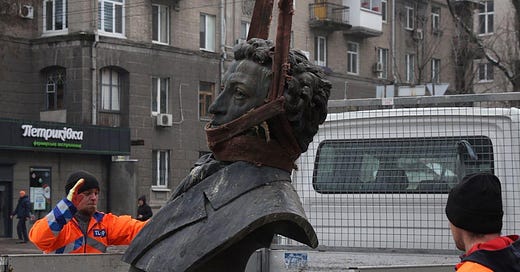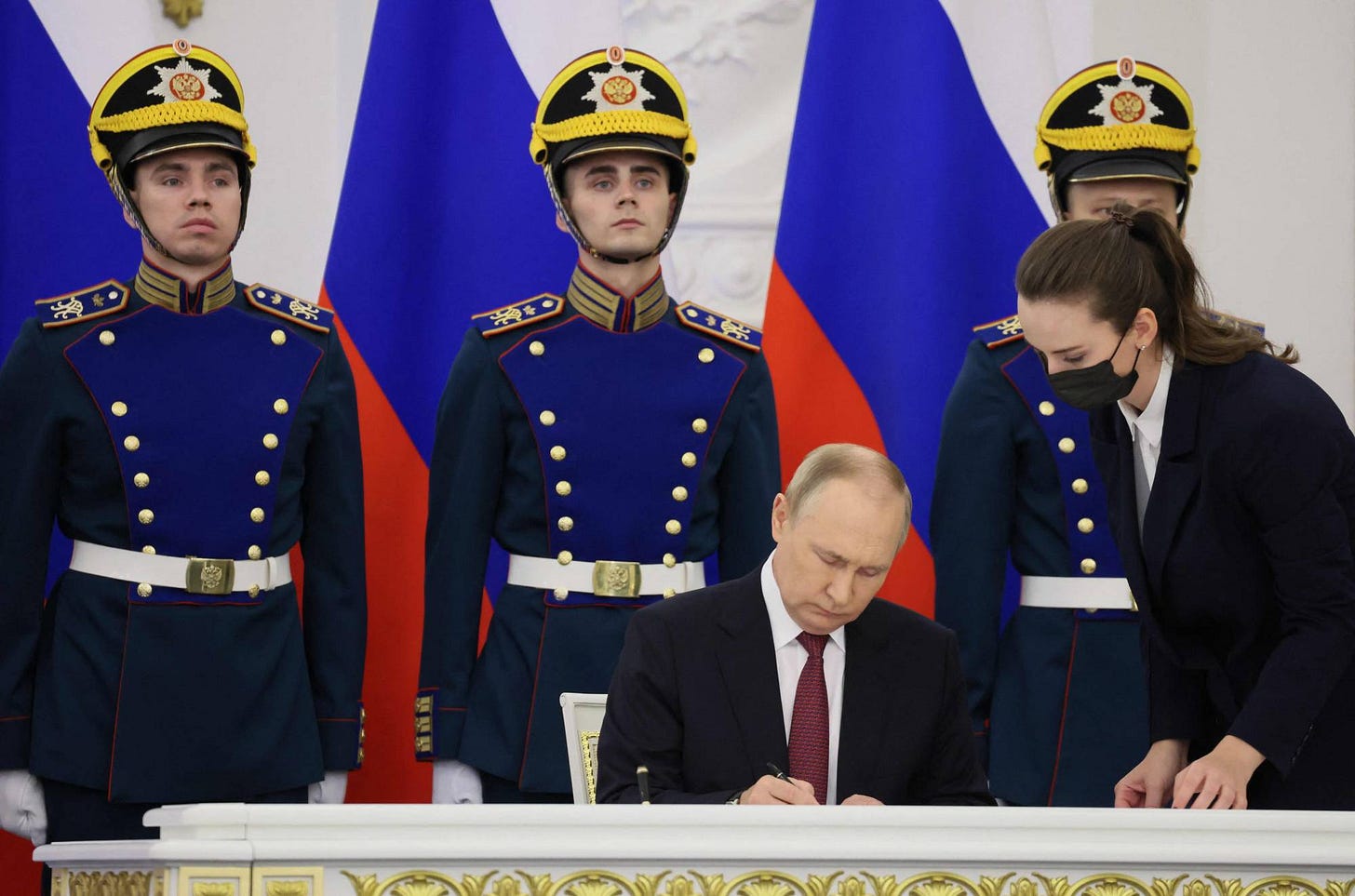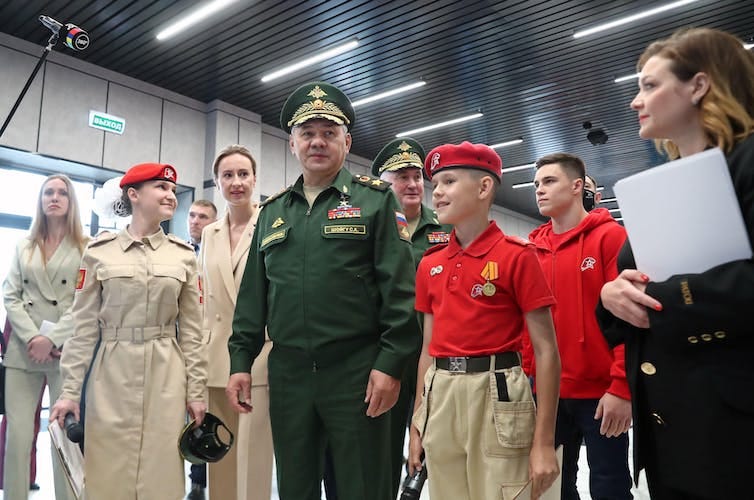Aug 5: How Russian colonialism took the Western anti-imperialist Left for a ride
By Alaric Dearment as published by Salon on July 31, 2023
How Russian colonialism took the Western anti-imperialist Left for a ride
By Alaric Dearment, Salon, July 31, 2023
Blindness to Russian colonialism distorts Westerners’ view of the Ukraine war
“Fucking shit Russian car," my driver spat as a Lada sedan passed us on the highway from Georgia's capital of Tbilisi to Stepantsminda during my trip there in 2019, shortly after our long conversation touched on Russia's 2008 invasion of Georgia.
His momentary flash of anger was an eye-opening glimpse at the consequences of Russia's steadfast refusal to let go of the 14 nations whose independence following the 1991 collapse of the Soviet Union dictator Vladimir Putin infamously called "the greatest geopolitical catastrophe of the century" – not to mention the ethnic minorities still under Moscow's yoke – and its brutal punishment of Georgia and Ukraine for daring to seek a bright future outside of Russia's sunless orbit.
The full-scale invasion of Ukraine has cast a long-overdue spotlight on Russian imperialism and colonialism, yet many Westerners fail to grapple with how Russia's colonial legacy continues to this day and is part and parcel to its war against Ukraine and descent into fascism. Consequently, many end up whatabouting, excusing and even overtly sympathizing with an empire whose colonial practices mirror those of historical Western European empires in cruelty, chauvinism, thievery, exploitation, cultural erasure, racism and genocide and that is now ruthlessly attempting to conquer one of its neighbors.
Russia displayed that ruthlessness last week when it lobbed missiles at Odesa, damaging port and grain storage facilities as well as its historic center, a UNESCO World Heritage site.
"They're interested in lands and influence and a buffer zone between them and the West, in sea access – but not in people and not in culture," said Ukrainian Parliament adviser Yuliia Shaipova who, together with her husband, Aspen Institute NextGen Transatlantic Initiative member Artem Shaipov, was at home in Odesa after hiding in a nearby bomb shelter.
Yet, Westerners safe from bombardment like long-shot third-party presidential candidate Cornel West continue to accommodate Russia. In a July 13 interview with CNN's Kaitlan Collins, West called Russia's invasion "criminal" but insisted it was "provoked by the expansion of NATO" and is a "proxy war between the American Empire and the Russian Federation," adding Neville Chamberlain-esque icing on the appeasement cake by proposing Ukrainian territorial concessions to Russia.
The tell in West's remarks was calling the U.S. an empire but referring to Russia by its de jure name, implicitly erasing its imperial, colonial character. It's a common tendency among the segment of the left to which West belongs, one that Kazakhstan-born Pitzer College sociology professor Azamat Junisbai attributes to ignorance and a myopic, know-nothing focus on American imperialism to the exclusion of imperialism by other nations.
"They're kind of imperial about their anti-imperialism," Junisbai said. "There's something very provincial and strange about it where you literally do not know anything about what's happening beyond this one issue you care about."
While West and other leftists blame "NATO expansion" for provoking Russia, Junisbai compares NATO membership – which, after all, the former Warsaw Pact and Baltic countries all sought voluntarily – to a restraining order against an abusive partner.
"People don't recognize that there was an abusive relationship, that there was colonialism," he said, speculating that blindness to Russian colonialism could be due to a failure of Western education systems as well as Soviet propaganda and leftist valorization of the Soviet Union as a foe of Western imperialism. Another potential culprit is knee-jerk distrust toward American foreign policy popular among some leftists and alternative media that leads to a simplistic "the enemy of my enemy is my friend" worldview.
"People, I think, just get so wedded to their vision of themselves as fighting 'The Man,' fighting the power that they are blinded and taken for a ride by Russia, in this case serving as useful idiots," Junisbai said.
Both Yuliia and Artem Shaipov pointed the finger at academic studies of Russia in the West that view it through Moscow's imperial lens. The two have published articles advocating for a "decolonization" of Russia studies and greater attention to how veneration of the "great Russian culture" – such as the genocide- and conquest-glorifying literature of Mikhail Lermontov and Alexander Pushkin – has provided a conduit for Russian imperialist ideology to sneak into the Western mind.
"Part of the reason is that it's Western academia that kind of perpetuates this imperial understanding of our region that benefits Russia's imperial policies," Shaipov said, pointing to how Western academic institutions place Ukraine and other post-Soviet nations under Russia's geopolitical umbrella of "Eurasia." "It speaks volumes about the reasons why still many people in the West see Ukraine and other independent states as the sphere of influence of Russia."
The resulting sympathy for Russia's imperial worldview finds expression among Western academics, media personalities and activists who deny Ukrainians' agency in repeating the Kremlin conspiracy theory that Ukraine's 2014 Revolution of Dignity was a "U.S.-backed coup" – as if Ukrainians couldn't have removed outrageously corrupt Kremlin stooge Viktor Yanukovych from office after his security forces murdered over 100 peaceful protesters without foreigners pulling the strings – or characterize former communist nations' NATO membership as provoking Russia rather than protecting them from it.
And it's a mindset rooted in over 400 years of imperialism and colonialism that caused atrocities as horrific as those of Spain or Britain.
Russia's conquest of Siberia starting in the 1580s, for instance, included the enslavement of indigenous peoples whom it forced to pay tribute in the form of furs known as yasak on pain of death, resulting in starvation as people struggled to meet yasak quotas instead of feeding themselves in a system some historians have compared to Belgian King Leopold II's enslavement of the Congo. Russian Cossack gangs raped and murdered while Orthodox missionaries stamped out native religions and alcoholism and smallpox decimated local populations. Today, indigenous people in Siberia and the Russian Far East frequently live in poverty while Moscow strips their lands' rich natural resources to line the pockets of oligarchs and fuel the glitz of cities like Moscow and St. Petersburg, while their men disproportionately make up the cannon fodder that Russia sends to the Ukrainian front.
"If we take the Russia that is situated behind the Urals – the Central Asian part of Russia, the far East Asian parts of Russia, the [northernmost parts of Russia] – the cities are just being used for extractive purposes, so [the Russians] don't care even about their own people and minorities that are in Russia itself," Shaipova said, noting how nearly all of their enormous wealth goes to the Russian metropole. "So basically, take Norilsk or Irkutsk – those cities look like an atomic bomb has exploded there."
In the Caucasus, where Russia vied with the Ottoman and Persian empires for power, the Muslim Circassians, who had inhabited the area for millennia, resisted Russian domination. So in 1857, Tsar Alexander II ordered their expulsion to the Ottoman Empire under a proposal by Count Dmitri Milyutin, who said it would "cleanse the land of hostile elements" and open their farmland for Christian settlers. The result was the Circassian genocide in which nearly the entire Circassian population was killed or expelled to the Middle East, where most Circassians live today.
Junisbai's own life is a testament to Russia's thorough colonization of his country, which began in earnest in the 18th century after Russia conquered it. His mother tongue is Russian rather than Kazakh thanks to generations of Russification that made learning Russian essential to get ahead while casting indigenous languages by the wayside. That led to him being conditioned to look down on Kazakhs who could not speak Russian properly while growing up in Almaty, whose population during the Soviet era was about four-fifths Russian and had only two Kazakh-language schools in the early 1980s, while Kazakhs largely lived in rural areas. Meanwhile, his great-grandfather was a member of the Kazakh intelligentsia, for which the Soviets executed him at Omsk in 1935 during Stalin's purges. Consistent with Russia's pattern of extractive relationships with its colonies, Moscow picked Kazakhstan as the place to test nuclear weapons, Junisbai's mother growing up only a couple hundred miles from a testing site.
The 2022 invasion of Ukraine brought to the forefront the issues of language and Russian colonialism that Junisbai had been thinking about for a while. Today, he spells Kazakhstan's name as "Qazaqstan," reflecting the native pronunciation, rather than the more common Russian-based spelling.
"This invasion – just the scale of it and how blatantly imperialist it was – was a point of no return," he said, regarding how it got him thinking more about those issues. "Like how strange and horrible it is that I am stuck with Russian, and it's like having something stuck in my body, and I cannot remove it."
In contrast with its terrestrial empire building, Russia didn't have as much luck overseas, as its North American and Hawaiian colonies proved unsuccessful, along with its lesser-known attempt to partake in that most infamous example of European colonialism, the 19th-century Scramble for Africa.
Russia's covetousness toward Ukraine differs somewhat from its other colonization activities, but comes from the same underlying desire to subjugate. It stems from the popular myth that Russia is the legitimate heir to the medieval state of Kyivan Rus, centered on modern-day Kyiv, which Putin cited in a July 2021 pseudohistorical essay denying Ukraine's right to sovereignty, "On the Historical Unity of Russians and Ukrainians." But as Ukrainian historian Serhii Plokhy points out in his new book, "The Russo-Ukrainian War," although the Grand Principality of Moscow – later called Muscovy – derived much of its culture from Kyivan Rus, 15th-century ruler Ivan the Great invented the myth of Muscovy's inextricable link to it by declaring himself the sole legitimate heir to the Kyivan princes in order to justify his conquest of the Republic of Novgorod.
"The independent Russian state, born of the struggle between Moscow and Novgorod, resulted from the victory of authoritarianism over democracy," Plokhy writes.
Shaipov said Muscovy inherited its political culture not from Europe, but from the Mongol Empire of which it had long been a vassal.
"This is their political tradition of authoritarianism, oppression and continuous imperial conquest," he said.
Ukrainians learned that the hard way in the mid-1600s when Ukrainian Cossacks rebelled against their Catholic Polish-Lithuanian Commonwealth rulers and established an independent state, seeking protection from their Orthodox co-religionists in Muscovy. But after helping them achieve victory, their Muscovite allies sought to dominate them, leading to another Ukrainian Cossack rebellion in 1708 that soon allied with Sweden. Muscovy defeated them at the Battle of Poltava in 1709, and in 1721, under Tsar Peter I, Muscovy became the Russian Empire.
In other words, Russian claims of lordship over Ukraine are about as credible as if British leaders called decolonization a "geopolitical catastrophe" and then dredged up medieval manuscripts to make the case against Irish independence.
The Russian Empire collapsed with the 1917 October Revolution, but that tradition of authoritarianism, oppression and imperial conquest persisted as the empire got a new coat of paint, trading tsars for commissars and rebranding as the U.S.S.R.
Numerous nations under Russian rule for centuries declared independence – including Ukraine as well as Belarus, Georgia, Armenia, the Tatar-led Idel-Ural State and others. But the Bolsheviks quickly invaded nearly all of them, forcing them into the newly established Soviet Union, which reoccupied the Baltic nations after World War II, leaving only Finland independent. In Ukraine, Stalin caused the Holodomor, a genocidal famine that depopulated most of the country's east, allowing its resettlement by Russians. In 1944, he accused indigenous Crimeans – for whom even the term "Crimean Tatars," Shaipov noted, is a misnomer with colonialist undertones – of collaborating with the Nazis and deported them all, allowing Russians to become a majority in Crimea too.
Those malign political traditions continued after 1991 as Russia crushed the fledgling Chechen Republic of Ichkeria and Tatarstan and sponsored pro-Russia breakaway states in Moldova's Transnistria region and the Georgian regions of Abkhazia and South Ossetia, where Russia used false accusations of genocide as a pretext for its 2008 invasion, a tactic it would rehash in Ukraine six years later.
And they live on today in Russia's nationalist, imperialist, bloodthirsty and downright genocidal "Z" propaganda for domestic audiences.
Even Russian liberals remain far from untainted. While Westerners lionize Alexei Navalny as a freedom fighter, Junisbai highlighted his history of racism toward Central Asians.
"Navalny is not really well-liked in Central Asia because he's the person who contributed to hate crimes against Central Asians in Russia," Junisbai explained, lamenting how many Westerners continue to see that part of Navalny's past as marginal.
Navalny also drew scorn for a series of tweets on July 25 in which he called Russian war criminal Igor Girkin a "political prisoner" following his arrest for criticizing Putin.
Shaipov and Shaipova pointed to how Jan Rachinsky, the head of Memorial, rejected the idea of Russian repentance for waging war against Ukraine in his Nobel Peace Prize lecture last year.
"This understanding of themselves as an empire is part of their national identity, and this is also what concerns the so-called Russian liberals," Shaipova said.
At the same time, Junisbai said people inside Russia consistently fail to acknowledge their nation's colonial history.
"The surest way to offend a Russian person is to talk about colonialism or Russians as colonizers," he said
Instead, Russians overwhelmingly view themselves – in true colonialist form – as having civilized Central Asians, believing they were illiterate before Russia introduced Cyrillic, despite Junisbai's grandfather having written in Arabic script, and that if not for Russia they would still be riding horses and living in yurts.
"It's just like, 'we built your schools, we built your hospitals – how dare you be disrespectful, how dare you not appreciate us,'" he said.
This lack of self-awareness stands in stark contrast with European nations that decolonized and, although in fits and starts, today seek to atone for past injustices. In 2021, Germany formally apologized for genocide in Namibia in the early 1900s, while Queen Camilla declined to wear a crown at King Charles' coronation bearing the Kohinoor diamond, which Britain plundered when it ruled India.
Shaipov and Shaipova said Russia must also undergo decolonization, a process the world should not fear.
"In order for them to heal, they need to go through this healing process and repentance so that they can reconcile with neighboring countries and with the peoples that populate the Russian Federation," Shaipov said.
But Russia must first remove the Harry Potter-like invisibility cloak that has long allowed its colonial legacy to go unnoticed.
"Once you tear it off, then people can see the horribleness – like, how could people side with an abuser and against someone who's trying to take out a restraining order against this abuse," Junisbai said.








Thoughtful, well-written and much needed.